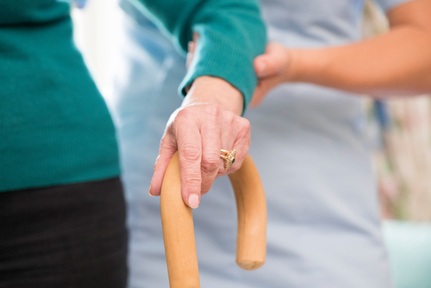Number of care job vacancies now at 52%, highest 'since records began'
The number of vacancies in social care is now at its highest rate on record with 165,000 unfilled posts, according to a new report.

The annual report published by Skills for Care found in the year to March 2022, there were a total of 1.79 million posts in adult social care. Of these 1.62 million were filled, leaving 165,000 posts unfilled.
The report also shows the number of filled posts fell by 50,000 compared with the previous year - the first drop ever and the average vacancy rates across the adult social care sector are at nearly 11 per cent, twice the national average.
Care chiefs are warning the report is yet another “signal” of a social care system “on its knees” and if these figures start becoming a trend, it will be really hard to find the extra 480,000 posts Skills for Care suggests the sector will need by 2035.
Professor Vic Rayner, chief executive of the National Care Forum said: “We need the government to acknowledge the huge challenges facing the adult social care workforce. The government needs to tackle the challenges head-on and deliver a strategic workforce plan that addresses pay, terms and conditions in a meaningful way.
“We are seeing the highest vacancy rate in adult social care since records began. This is the result of chronic underfunding and a lack of workforce planning that has been years in the making.
“The government should now prioritise improving pay by bringing forward a fully funded, strategic workforce plan for adult social care in England. This will not only benefit the people that deliver vital care but will also improve the lives of people that draw from it.”
’Billions have been wiped off social care budgets’
The report also warns 28 per cent of the care workforce are aged over 55 and may retire in the coming decade.
The Independent Care Group (ICG) says the sector can’t afford to “lose any more staff”, especially those with years of “care experience under their belts”.
ICG chair Mike Padgham said: “Billions have been wiped off local authority social care budgets in the past decade and providers are being squeezed as a result.
“More and more of them are ceasing to operate whilst the rest battle to survive.
“The simple fact is providers are paying the workforce as best they can in the teeth of a critical shortage of funding.”
Martin Green chief executive of Care England said: “With the government reporting a 38-year low in unemployment and the adult social care sector seeing an all-time high in vacancy levels, change is needed now.
"We need to develop some clear skills and competency frameworks, and a set of portable qualifications so that people can easily move between providers, and this must be done with a matter of urgency.”
Karolina Gerlich, chief executive of the Care Workers' Charity added: "It should come as no surprise to anyone that social care is struggling to recruit and retain staff when 50% of workers will earn within 30p of the national minimum wage, in a role that requires individuals to take responsibility for the life and wellbeing of another human being.
"We hear constantly about sector reform, training packages and technological innovation, but we hardly ever hear concrete proposals which will improve pay. We know most care workers find meaning in their work regardless of the pay, but when working in care makes you more likely to live in poverty, we have a serious problem. No one can be expected to do such meaningful work at their own expense."
Helen Giles, director of people and culture at Revitalise also called for higher wages across the sector and said for the perception of social care work to change, "it needs to be placed on an equal footing with the NHS and be prioritised in the same way".
’Exhausted care workers are looking elsewhere’
The report shows care workers with five years’ experience are paid seven pence per hour more than a care worker with less than one year’s experience and the average care worker pay is £1 per hour less than healthcare assistants in the NHS new to their roles.
The union GMB is campaigning for care workers to be paid no less than £15 an hour.
Rachel Harrison, GMB national officer, said: “GMB has warned for years that low pay and working conditions in care were unsustainable, and now we are seeing the consequences.
“It’s little surprise that exhausted care workers are looking elsewhere when they are expected to survive on a whisker above the minimum wage."
’We urge the government to help grow the economy’
The report estimates adult social care contributes £51.5 billion per annum to the economy in England in 2021/22.
Oonagh Smyth chief executive of Skills for Care called the figures "unwelcome trends" and said: "We cannot forget that behind every statistic are people’s lives, people who might not be getting the support that they need.
“Our society needs a step change in how it values social care and the great people who provide it.
"The high vacancy rate is an opportunity to recruit more people to work in a job that is rewarding, increasingly valued by the public and offers long-term career opportunities".
To read the full report, click here
Latest News
 29-Jul-24
Dementia Bus gives carehome.co.uk staff insight into life with dementia
29-Jul-24
Dementia Bus gives carehome.co.uk staff insight into life with dementia
 01-Mar-24
Find out the top care homes in 2024
01-Mar-24
Find out the top care homes in 2024
 21-Mar-23
UK's top care homes in 2023 revealed
21-Mar-23
UK's top care homes in 2023 revealed
 03-Jan-23
carehome.co.uk launches free care helpline
03-Jan-23
carehome.co.uk launches free care helpline
 13-Dec-22
5 mins with Emily Whitehurst, chief operating officer for Constantia Healthcare
13-Dec-22
5 mins with Emily Whitehurst, chief operating officer for Constantia Healthcare